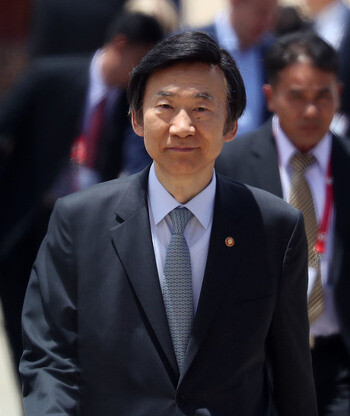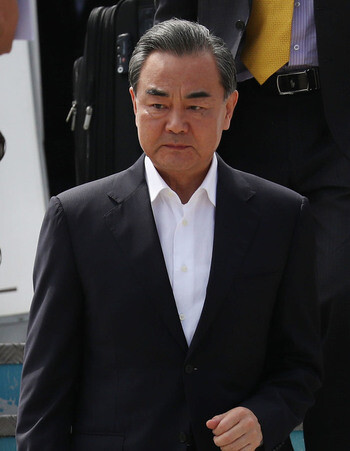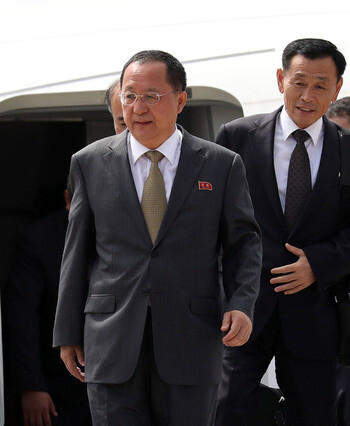hankyoreh
Links to other country sites 다른 나라 사이트 링크
[Analysis] At ASEAN forum, are China and North Korea embracing again?

A China Southern Airlines plane arrived from Beijing by way of Kunming at Wattay International Airport in Vientiane, Laos, at around 2 pm on July 24. The first to step out of its doors was Chinese Foreign Minister Wang Yi, dressed in a black suit without a tie. Dozens of waiting reporters from South Korea, Japan, and elsewhere surrounded him and began firing questions at him.
“Was [North Korean Foreign Minister] Ri Yong-ho on the plane with you?” asked one.
“He was on board, and we gave each other our regards [during the trip],” a smiling Wang responded briefly before leaving his questioners and heading for the VIP terminal.
About a minute later, Ri emerged from the airplane, his strapping frame clad in a gray suit. He came to attend the ASEAN Regional Forum - the only regional multilateral security meeting North Korea attends. For Ri, it was a debut on the multilateral diplomacy stage since being appointed to his position just after the seventh Korean Workers’ Party conference in May.
His group attracted even more reporters than Wang had. The questions came fast and furious.
“Do you have plans for a bilateral summit with China?”
“Do you have any plans to meet with [South Korean Minister of Foreign Affairs] Yun Byung-se?”
“It’s been reported that you’re going to be in Laos until July 28 [after the meeting ends]. Do you have anything scheduled?”
“Could you share your feelings?”

Ri gave no response. But even amid his silence, the minister - who has been described as being unlike other North Korean diplomats with his strong English proficiency and more flexible attitude since his pre-minister days as Pyongyang’s senior representative at the Six-Party Talks - kept a slight smile on his face. It was a silence that didn‘t seem to send a negative message, if only because he made no effort to propagandize the official position of North Korean authorities. After leaving the airport, Ri stopped at the Presidential Palace before heading to his lodgings at the Don Chan Palace hotel - the same place where the Chinese delegation would be staying.
The unusually overlapping schedules of the North Korean and Chinese delegations are certainly eye-catching: Ri being seen off by the Chinese ambassador to Pyongyang on July 23, Ri and Wang traveling together on the plane to the Laotian capital, and the decision for both delegations to stay at the same hotel. The two sides did not hold a bilateral foreign ministers’ meeting at last year’s ARF event, an apparent reflection of the chill in their ties. Since 2016 began, they have been in conflict over Beijing joining in international sanctions against Pyongyang, including the adoption of United Nations Security Council Resolution 2270 in response to the North’s fourth nuclear test.

Under the circumstances, the unusual tandem movements are enough to raise questions over whether China is embracing North Korea once again. Indeed, coming after Beijing‘s vehement objections to Seoul and Washington’s announcement of the decision to deploy a Terminal High Altitude Area Defense (THAAD) missile defense system with US Forces Korea, they could be seen China sending as a tacit diplomatic message. And with Northeast Asia in turmoil recently over the dispute in the South China Sea, the North Korean nuclear and missile issues, and the THAAD controversy, the ARF meeting on July 26 - to be attended by foreign ministers from all six of the parties in the Six-Party Talks - and the series of associated meetings between ASEAN-related foreign ministers have been called a battlefield in “diplomatic warfare” and a test of whether coordination against Pyongyang has loosened in the wake of Seoul and Washington’s THAAD announcement.
By Lee Je-hun, staff reporter in Vientiane
Please direct questions or comments to [english@hani.co.kr]

Editorial・opinion
![[Column] Park Geun-hye déjà vu in Yoon Suk-yeol [Column] Park Geun-hye déjà vu in Yoon Suk-yeol](https://flexible.img.hani.co.kr/flexible/normal/500/300/imgdb/original/2024/0424/651713945113788.jpg) [Column] Park Geun-hye déjà vu in Yoon Suk-yeol
[Column] Park Geun-hye déjà vu in Yoon Suk-yeol![[Editorial] New weight of N. Korea’s nuclear threats makes dialogue all the more urgent [Editorial] New weight of N. Korea’s nuclear threats makes dialogue all the more urgent](https://flexible.img.hani.co.kr/flexible/normal/500/300/imgdb/original/2024/0424/7317139454662664.jpg) [Editorial] New weight of N. Korea’s nuclear threats makes dialogue all the more urgent
[Editorial] New weight of N. Korea’s nuclear threats makes dialogue all the more urgent- [Guest essay] The real reason Korea’s new right wants to dub Rhee a founding father
- [Column] ‘Choson’: Is it time we start referring to N. Korea in its own terms?
- [Editorial] Japan’s rewriting of history with Korea has gone too far
- [Column] The president’s questionable capacity for dialogue
- [Column] Are chaebol firms just pizza pies for families to divvy up as they please?
- [Column] Has Korea, too, crossed the Rubicon on China?
- [Correspondent’s column] In Japan’s alliance with US, echoes of its past alliances with UK
- [Editorial] Does Yoon think the Korean public is wrong?
Most viewed articles
- 1[Column] Park Geun-hye déjà vu in Yoon Suk-yeol
- 2Thursday to mark start of resignations by senior doctors amid standoff with government
- 3N. Korean hackers breached 10 defense contractors in South for months, police say
- 4Kim Jong-un expressed ‘satisfaction’ with nuclear counterstrike drill directed at South
- 5[Editorial] New weight of N. Korea’s nuclear threats makes dialogue all the more urgent
- 6Will NewJeans end up collateral damage in internal feud at K-pop juggernaut Hybe?
- 7[Column] ‘Choson’: Is it time we start referring to N. Korea in its own terms?
- 8[Editorial] Japan’s rewriting of history with Korea has gone too far
- 9[Cine feature] A new shift in the Korean film investment and distribution market
- 10[Column] The president’s questionable capacity for dialogue